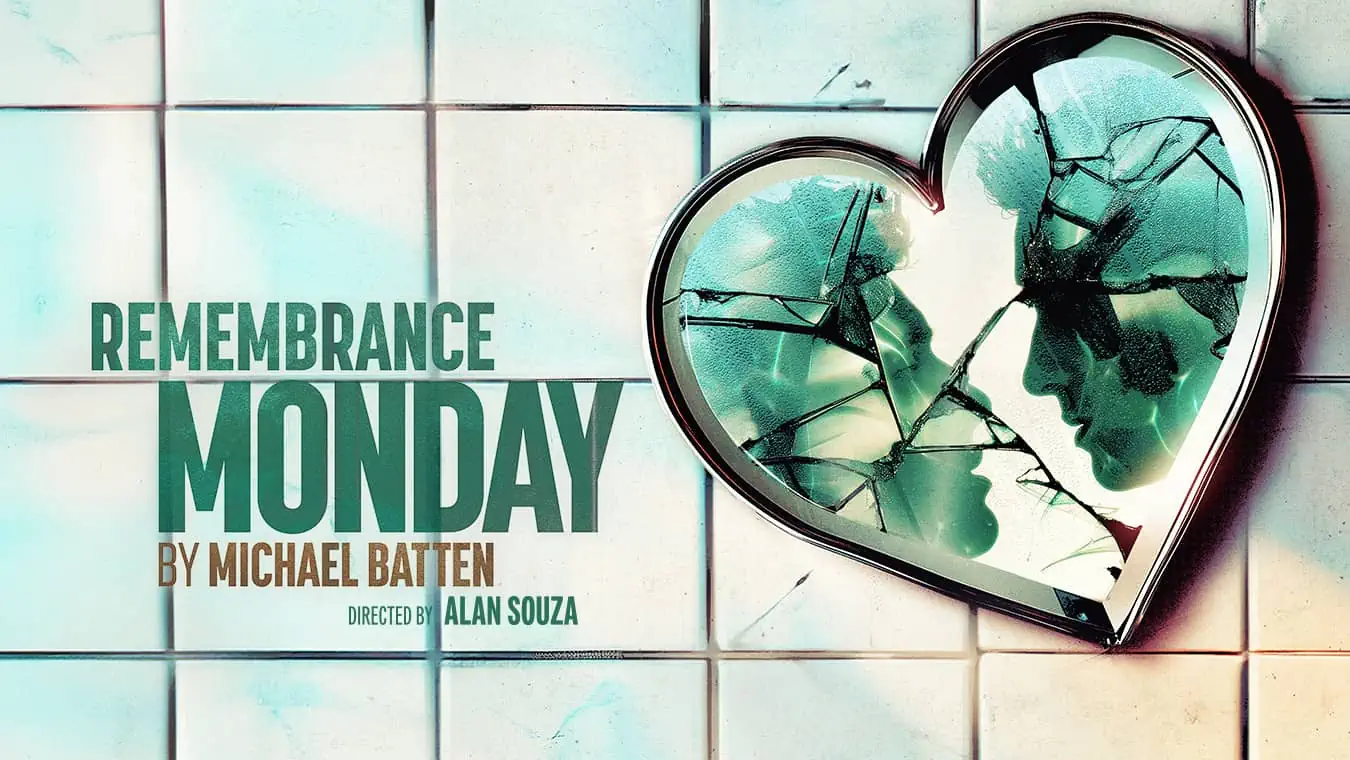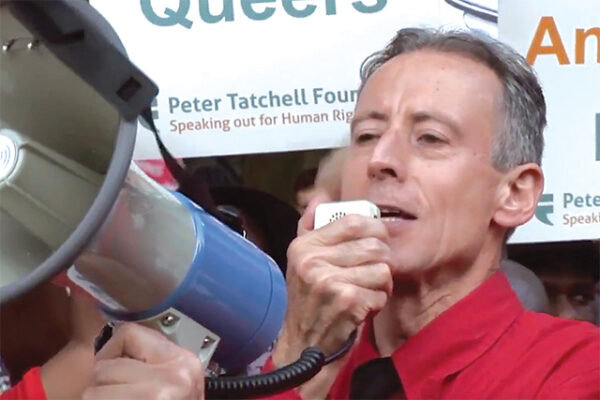Lord Norman Fowler was the Conservative Health Minister when HIV/AIDS appeared in the 1980s. Here he talks to QX about that history and his new book AIDS: Don’t Die of Prejudice
By Patrick Cash
Lord Norman Fowler at a Positive East talk on his book – credit: Andrew Pennington
How did you get started on this book?
I started in 2012 when I went over to Washington for the International AIDS Conference there and it occurred to me then that although UN AIDS and WHO all had these wonderful figures about what’s happening here, what’s happening there, there was no real description about what was happening around the world. And obviously I didn’t have the resources or the time, because it might take several years to actually do this, to go to every country in the world, but I did have the time to go to 9 major cities. I went to Capetown and Entebbe and Nairobi, but I also went to Eastern Europe, I went to Moscow and the Ukraine, I went to New Delhi and I went to Australia, to Sydney, which was actually very interesting, and to Washington, and London obviously also. So I did about 9/10 cities of the world and tried to draw out of that what was the position around the world and what the possible solutions and ways forward could be. And actually, in fact, I don’t think I would have got more had I gone to another 9 cities because after the 9 cities’ travel, you had a pretty good view of what was happening.
How long did you spend in each city?
Depended, really. It might have been a week, some two weeks. Some I went back to, Kiev in the Ukraine I went back to, I managed to arrive in Kiev on the first night of the revolution, so I was in Independence Square literally with the cans burning and speeches being made and flags flying – the first time I’d ever seen a European Union flag being flown with such prominence and enthusiasm. And the people I was with said ‘it might be a good idea to go and talk about the British Health Service’ and I said ‘on balance, I think this is not the time to talk about the British Health Service’. But they’re terribly good, they’re terribly nice.
What’s the situation like in Kiev?
In Kiev… Certainly up until the change, pretty dire.
Very homophobic?
Very homophobic, not as – well, perhaps they are as homophobic as the Russians but what the Ukraine government at least did was they did allow other people to come in and help. So they allowed the HIV Alliance from Brighton – Brighton and the world, it’s got its headquarters in Brighton – to come in and they’ve done some tremendous work with drug users for example. So you can get clean needles and you can get methadone but that’s because it’s entirely financed and done firstly by the Global Fund and second by the Alliance. So they do allow it but the general view is that gay people, drug users, transgender, they all come pretty low, I mean not pretty low, very low, probably last, on the list of priorities.
What kind of statistics do they have in terms of HIV infections?
I remember the figures best for Russia: in Russia the new cases of HIV are continuing to increase absolutely. In other countries around the world you tend to find that new cases are certainly increasing but they’re probably not increasing as much as they were the year before, you see a certain evening out of the increase, it’s not saying very much but it’s saying something. In Russia it’s still going up, about 10,000 a year for HIV, and that is because the Russians don’t allow clean needles, they don’t allow methadone, particularly don’t allow methadone, and they believe entirely in a sort of form of cold turkey, beating people out of drug use and it doesn’t work. I mean it’s been shown not to work, everyone knows it doesn’t work, the figures show it doesn’t work, but they continue to say that first it does work and secondly you can’t treat drugs with another form of drug ie you can’t use methadone. Which is a neat political saying but it doesn’t mean anything and it goes totally against all evidence. Regrettably the United States have actually taken that view in their overseas policy – their overseas policy not their domestic policy. In giving aid, they won’t give aid to methadone harm reduction policies generally, but there we are. So in some ways I think the world is going backwards.
There are a lot of fascinating points there, but just to talk a little bit about Russia, why do you think Russia’s draconian attitude towards drug users is like this, is it because of Putin’s regime or the historicity of attitudes in Russia?
There’s a lot of history in it. Putin obviously doesn’t help and Putin takes the view that if one’s in trouble in domestic policy then you can have a nice anti-gay piece of legislation which helps you with the public, but the roots of it all go back much further, it is historic and also treatment is historic. They tried to beat people out of using drugs in the same way –
Literally?
Sometimes, yeah, I mean there were pretty horrid stories coming out. And that’s what they tried to do to people with alcohol problems as well, it was very cold turkey stuff, you know, ‘we’ll force it out’, people being handcuffed to beds and worse than that. The trouble is, I think, the officials and ministers, basically when it comes to it, don’t care. I mean that’s what it really means. Anyone objectively looking at the evidence would say ‘your policies aren’t working, they haven’t been working for a long time, they may be traditional Russian policies but for goodness’ sake, you know, look at the evidence and the evidence is all around the world’. We introduced, I introduced, clean needles here in 1987, it’s quite a long time ago, and it’s now been adopted by many countries around the world and the result has always been the same that HIV through shared needles has come down and that’s not entirely surprising.
In regards to transmission, in the countries that you visited did you see transmission as a bigger prevalence amongst gay men or drug users or was it about the same?
I think it depended where you were. In Eastern Europe it is about drug users, that’s the characteristic issue, and it’s about drug users because a lot of people use drugs and it’s not just heroin, they use the home-made drugs as well. Various ingredients put together and you check and you think this is self-evidently a dangerous thing to do but people don’t appear to care too much about that, so it’s a bit of a badge of poverty and lack of opportunity to do anything else, but I mean Russia and the Ukraine, their characteristic problem would be drugs. But if you go to Africa obviously the characteristic problem there isn’t drugs, it’s sex, although it has to be said even in Africa now drugs are beginning to appear. In Kenya, in Mombassa for example, they’re introducing as a pilot a clean needle policy there.
So when you say drugs are appearing in Kenya, do you mean heroin in the main?
Yes, I think it is, because it’s a port and it can be imported and that tends to be what happens. We don’t know how much it’s going to catch on there. So it’s a fairly grim prospect actually.
It does seem like it. Okay, a question I ask everybody, just for any of our readers who might not be familiar with you, can you tell us a little bit about yourself in your own words?
Well, I’m a Conservative politician, I was in Margaret Thatcher’s cabinet for 11 years, I was the Health Minister and it was when I was the Health Minister that the issue of AIDS came up and so in 1985/86/87 we had this terrible prospect of, predominately in this country, young men who had HIV, developed into AIDS, there was nothing we could do about it, there weren’t any drugs to treat people with, and so the vast majority died. And it was a most depressing and rending prospect. And there was nothing you could do in terms of treatment, there was something you could do in trying to prevent it. I mean other people becoming infected and that’s why in 1986/87 we ran a major publicity campaign which is still played from time to time and it was intended to bring people up short, to shock and to above all get their attention. We did use tombstones and we did use icebergs and things of that kind, and the result of it was controversial, people said we shouldn’t do it, many people including Margaret Thatcher said we shouldn’t be so explicit about it, we should just gently get round the issue. And our view on this was if you’re going to do it you needed to do it properly, the public weren’t fools – we didn’t take the view, as Margaret Thatcher appeared to, that if you actually told young people of the dangers then the result of that would be that they would go away immediately and start doing it. It just didn’t seem to make sense and it didn’t make sense actually, and all the evidence afterwards showed that it was completely wrong in theory, and the result was that HIV came down, that sexual disease generally came down and at the same time we introduced clean needles as well and then methadone and that has been a permanent advantage ever since. I mean the numbers of new cases through sharing needles has been about 1% of new cases for the last 20/30 years. It’s been outstandingly successful, but again there was a great argument about ‘you’re condoning crime, encouraging crime’. Well, when I did a select committee in this house about a year ago, I asked the Chief Constables, had there been any increase in crime because of this and none of them could think – there’d been an increase in crime for various reasons, but not because of this. So it is in my view a no-brainer really, we’ve established it works and that’s how I came into it. After I left government I became chairman of the Conservative party and then sitting in the shadow cabinet but I continue with my interest in this area, and I was on the board of the Terrence Higgins Trust for a long time and I’m now a patron of Beaver, which is the HIV clinicians, but perhaps above all, I’m on the board – which I joined in the course of this book because I got converted to it – of an organisation –
A still from Lord Norman Fowler’s AIDS Campaign.
A Baroness interrupts.
Baroness: I’m not interrupting, I’m merely saying what a brilliant speech that was, not just the witticisms but your defence of LGBT rights and the needle exchange. I was at the Met Office at this stage where we accepted the whole needle exchange issue, so we were quite enlightened.
Lord Norman: The major problem we had was over Scotland actually!
Baroness: Well, they’re more reactionary the further North you go.
Lord Norman: They had the biggest problem, I never understood this. They had by far the biggest problem.
Baroness: I didn’t mean to interrupt, but good luck to you and all your campaigns.
Baroness leaves.
Lord Norman: – so I’m on the board of something called IAVI, the International AIDS Vaccine Initiative in New York, and we’re trying to develop a vaccine and that is very difficult, people have been trying for 30 years to develop a vaccine.
There have been some developments with stem cell research haven’t there?
Yeah, there have been some quite optimistic things; at one stage in Thailand they managed to provide a vaccine which they claimed was 31% effective. Obviously 31% is not remotely good enough, but if we could provide a vaccine it would cut through all this, and really what it would cut through is all the prejudice and the discrimination because one of the problems at the moment is that if you’re in Africa and you happen to be living, as you quite likely are, in a country where homosexuality is illegal, are you going to come forward for a test? Well, you’re going to think twice about it and obviously many people don’t come forward. If, on the other hand, there’s a vaccine which everyone has irrespective then you don’t do away with the prejudice but you do at least go round it as far as HIV is concerned. So if we could have that it would be fantastic.
And what stage do you think they’re at at the moment? Can you reveal that?
No one knows, no one knows. I think what one does have to do, governors have to do, is persuade them that they need to continue financing it. And they need to put money into it, and that will speed up the process greatly. At the moment, people are really struggling for money.
So in the 80s when you were head of the health department, when did you first start hearing reports of AIDS and how long before those reports made the Health Department decide that they needed to take action, that this was becoming a threat to public health?
I was Secretary of State and it became an issue, something which was being noticed, in ’84 I would guess? ’85 we were beginning to get concerned about it, and I should think it was about ’85/’86 that we really started trying to persuade, and then we had the whole battle of trying to persuade the government that we should start a public health initiative. I can’t be precise, but I guess it was ‘84/’85.
What were peoples’ reactions when they first heard about it?
It depended. Many people were supportive throughout and there were many others who simply took an entirely antagonistic view, particularly as gay men were concerned and also drug users I guess. Basically their theory was, there were a lot of ridiculous theories going around at the time but one was that anyone with HIV should be isolated and put somewhere. The other argument was, the Chief Constable of Manchester for one, simply said ‘these people are sinners and they should be left to their own devices’ and the Chief Rabbi came pretty near to actually saying that, and that we shouldn’t have a public health campaign, what we should do is teach fidelity and ‘morals’. But even if you took that view you only had to think about it for 30 seconds to realise that if you did take that view, a campaign on ‘morals’ would explode before your eyes the first time a minister was found to be having an affair with an actress. I mean it’s a ridiculous way forward for governers, it’s been established pretty clearly time and time again, the public will accept good, straightforward health advice, that’s why we gave them good, straightforward health advice which didn’t pull any punches and described what happened and what the position was, but that was fine and we did a survey afterwards and over 90% of the public agreed with us. There were 7% who said ‘we object to leaflets being sent to our door’ and there were people who said ‘we will burn the leaflets in case our daughters or sons get hold of them’ but actually there was a lot of that before and none of that happened. We had next to no complaints about it at all, you can trust the public. In the main, the public are quite sensible.
Are you encountering the same prejudice existing as you found in the 1980s, in the countries you’re visiting now?
Yes, there’s a lot of that. And the thing which has shocked me most really is that there is prejudice but I hadn’t realised quite how deep it was. I mean you go to Uganda, but not just Uganda, Nigeria, a whole range of countries and there’s deep prejudice. In Russia, deep prejudice. I mean the situation in Russia has been made worse with the legislation toughened up, not weakened. India, I would say deep prejudice there, and I don’t see how we’re ever going to quite win this battle if you have this degree of prejudice because what it means is that people are not going to come forward for testing let alone for treatment. You can’t get treatment unless you get tested in the first place. From a pragmatic point of view, there’s the issue of human rights but also purely of public health. I mean if you can’t do this then you’re not going to win, and that, it seems to me, is going to be one of the profound challenges. People say to me all we’ve got to do is spend a lot more money on drugs and we do have to spend more money on drugs but to say that’s the answer is simply ridiculous because you’ve still got to persuade people first of all to take the treatment, and then secondly stick with the treatment, and then another thing that comes up is that in so many countries people are dropping off treatment which makes the position worse, and there’s this whole question of drug resistance which I’m beginning to go into now.
What’s the drug resistance?
Well, it means that basically that you become resistant to stage one antiretroviral drugs and you have to go to stage two and then go to stage three –
The drugs don’t work?
The drugs don’t work.
Have you encountered any of that in the UK?
I would have thought we had really. And I’ll tell you more about it when I’ve done a bit more work on it.
And in the UK do you think enough is being done for prevention of HIV transmission right now and do you see the big groups like THT, GMFA and Stonewall working together cohesively or at splintered angles?
I’m not sure that I’m in a position to judge on that. I knew THT, I know THT fairly well, but as you probably know there’s been a big change in the personnel there, I don’t know the new personnel. I used to know Nick Partridge and Lisa Power and Paul Ward and Genevieve Edwards, all those sorts of people, who all seem to have left at the same time, which is a pity. I’m a little reluctant to go in for reorganisations, because I think once you start trying to do that, you take the spark away which has actually created the organisation in the first place. I never felt that THT and Stonewall and NAT, I never felt that they were at odds really with each other, I thought that together they provided quite an effective voice. Perhaps they should come together even more for their voice as a joint voice, because there’s no question that in this country we do need to wake up to the fact that HIV has not gone away. A characteristic comment in London when I was having lunch or dinner or something, talking to people who weren’t in this area, and I said I was doing a book on HIV and AIDS, and the characteristic response to that was ‘is that still a problem?’ And you say: ‘actually, 100,000 people with HIV and 25%, perhaps a little less, are undiagnosed’, and that comes as a big surprise to most people. It’s quite important that we have voluntary organisations who bang the drum a bit about this. And also keep the government up to speed a bit; the government has devolved quite a lot of it to local councils and the public health responsibility of local councils and I think the jury is out on whether that’s going to be an effective way of working, I hope it is, but it’s quite a challenge for Public Health England to make that work. I don’t know how many boroughs you’ve got in London, over 30, so in a sense what you’re going to have to do is bring them all together and isn’t that where we started?
And especially with them having to put together their services to deal with both sexual health and drugs for gay men right now – do you think there’s enough being done for HIV prevention in the UK?
No, I don’t think enough is being done, period. Prevention is a Cinderella of the health service, it always has been a Cinderella of the health service. My campaign in ‘86, ’87 was the biggest campaign by a mile that has been done in this country since the Second World War and it’s ridiculous, I mean no business would actually run a campaign of that size and then go off the air again for the next quarter of a century. We did a survey with my select committee in 2011 and we found out we were spending about 800 million to a billion pounds on treatment and care for those with HIV – how much was the department spending on health promotion and prevention? 4.9 million, so we said actually we must spend more and what did they do? They cut it even further. We’re now spending 4.5 million. It is completely crazy. No one seems to actually understand the issue of investment, the idea that if you invest money in preventing things – not just HIV but many other things – then you may be successful. The Treasury says ‘oh, we can’t prove that’. But actually you can prove that with HIV because again the ’86, ’87 campaign showed that you could actually reduce the instances of the disease.
What was the tipping point where you got the a-okay for that campaign, what really pushed it?
I think what really pushed it was that we managed to put together a cabinet committee, a separate cabinet committee to deal with AIDS, and we had half the cabinet on it. So we had the home secretary, the foreign secretary, the Scottish secretary, the Welsh secretary, a whole range of Cabinet ministers on it, and what was quite interesting, you know it’s a bit of insider Whitehall stuff, because up till then it’d been done in a General Committee, a general home affairs committee, and people came along with no particular expertise, read their brief, and used their own views or prejudices on the subject. Once you did the separate cabinet committee, people took ownership of it, and in the space of literally 6/7 different meetings we transformed the whole situation, and so that was the real turning point. And I had brilliant support from Willie Whitelaw who was the Deputy Prime Minister. He was indispensable and he treated it very much as the old soldiers; he’d seen sexual disease in the army and he treated it in an entirely pragmatic way, none of these arguments about ‘we should be preaching a moral cause’ or whatever it happened to be.
I saw, when reading about the book, that there was an advantage in the cabinet having a number of ex-military people in their dealing with diseases like VD etc, that it had to be prevention it couldn’t be any other way…
Yes, absolutely. I mean Willie Whitelaw was in the Second World War, people like me weren’t in the Second World War but we had had two years in the army and I remember in the army as young recruits we were shown this public health film which I have to tell you if the public were shocked by ours, they should have seen this one, it was real fire and brimstone stuff. So it didn’t absolutely come as a surprise, once you get it on to that level you can stop actually arguing about whether people deserve treatment and whether some disease is good and some disease is bad, which is complete nonsense. And also the other thing that we did note, I had a very wonderful Chief Medical Officer Donald Atchkinson, who I half-dedicated the book to, and he reminded me that in the Second World War, no the First World War, there was the whole problem of VD when people went on leave. And so they tried one publicity campaign where it went ‘think of your country, think of the king’ and that had absolutely no effect whatsoever. But once you started giving them practical advice upon what to do and how to prevent it, that had a lot of effect, and you know it’s the same again. Good, pragmatic public health policy, which I believe in totally.
Excellent. For people who you spoke to on your travels and research what was the biggest social stigma you faced on HIV/AIDS?
Well, I think if you happened to be a gay man in many African countries you not only faced the prospect of being prosecuted, you face the prospect, if not certainly, of being thrown out of your home. You face the fact that your families will turn their backs on you, and you then have to go and make your way as best you can. And the same is true of women. In India, if they have HIV, almost invariably given to them by their partners but the woman is blamed, particularly if the partner dies, they’re thrown out. The whole thing is grotesque. And so that’s why I called the book ‘Don’t Die of Prejudice’. The amount of prejudice which there is, is thick slices all over the place. I remember talking to a man in Macedonia, which is a country most people know nothing about whatsoever, it’s one of the smallest countries of the world, just off Greece and the guy had contracted HIV about 18 months previously and he was trying to form a parliamentary group, and as we were crossing a bridge I said ‘well you must do a lot of these interviews’ and he said ‘oh no, no, no, I’m not that brave’, so here was the man who was actually trying to form the parliamentary group but considered it far too brave to go on to the radio to actually talk about it. It’s all over. I mean to counter it, to be fair, politicians have to take a hand in this, the church needs to take a hand in it, the church does not very much in my opinion, and some do even worse than that, they support some of the legislation that’s going through, like the Orthodox Church in Russia, and the Anglican Church in Uganda.
And there’s this whole witchhunt of homosexuality is supposed to be spurred on by the radical evangelical Christian groups from America, isn’t it?
Yes, yes, in Uganda, yes.
Have you encountered much prejudice or stigma yourself on devoting your research to this subject?
No, I don’t think I have, really. I mean probably people might say behind their backs things but no one’s actually said to me ‘why are you doing this, isn’t it all a waste of time, why don’t you go and do something useful?’ I don’t think I have, quite a number of people are slightly intrigued that a past Chairman of the Conservative party should be campaigning for this, but my answer to that is it was slightly accidentally that I got into it because I was Health Minister at the time, but I’m not going to stop doing it if I see that the problem is still there. And also I’m not bowled over in the rush by the other politicians to get involved because politicians are embarrassed by getting into sex, the issue can be – not just that you’ll be opposed, you’ll certainly be opposed, but you’ll also be lampooned as well. Even people who are meant to be your supporters can actually have a bash as well, so it can be a fairly frustrating time, but there, compared with the problem, of 35 million dead and 35 million infected if one just did anything to actually help that issue that’s… I mean I get frustrated at times by seeing the amount of attention which is devoted to some issues which are important but don’t really remotely come up to the scale of what we are talking about here, so there we are.
And you might have left government by this point, but what were your thoughts on Section 28?
I didn’t pay enough attention to it, I’m afraid. It wasn’t basically my department, it was being done by the Bar or Education, I can’t remember which, and I was doing Employment at the time. It was a big mistake, it was a big mistake, no question about that. It’s been repealed, thank goodness it’s been repealed, and I know people get very upset in retrospect about it and I can understand why. Fine. But I think the issue is about today and the future, not what happened in the past, 20/30 years ago.
Do you think it might have in part been a partial reason for this chemsex syndemic or gay men’s use of drug that we’re seeing right now?
How do you mean?
Such as the denial of the mention of homosexuality, it was essentially silencing the mention of homosexuality in schools, made this gulf between gay men became sexual they didn’t come out as homosexual because they perform, they perform as heterosexual, and this creates a gulf of intimacy between them and their closest ones which is intertwined with their burgeoning sexuality, but you have this great psychological development going on that’s intertwined with sex, so now you see gay men using drug as a tool to be sexual in their adult lives…
You mean built up a frustration?
Yes, I think so, built up a frustration but also had a working in… Denying a truth, I suppose.
I don’t know, I’d never heard that theory before. I rather take the straightforward view on chemsex drugs that they’re – I mean they’re highly dangerous – but the attraction of them is obviously a sexual attraction, whether it has its roots elsewhere I don’t know. It is interesting at the moment that chemsex drugs tend to be used by gay men and people tell me by middle-class gay men over the river from here, and they have their parties…
I think it spans the classes.
I think you’d be a bit pressed frankly to make the connection between one and the other. The other is quite a long time ago now, and chemsex drugs have obviously appeared elsewhere in the world as well, but I mean I don’t know, it’s another area that we need to go into in rather more detail. I’m still not quite sure how big this issue is, some people say it is very big, others warn against it.
I’d say from my own experience, it’s big. It’s big.
Yes, that’s my instinct I have to say.
There’s a lot of it going on.
And there’s no particular reason why it should stay within gay people is there?
No, I think it’s very much bound up with the gay male community and their relationship to sex. It’s lingering elements of shame to do with sex, that gay sex was the wrong sex historically, and intimacy issues that gay men are finding it hard to be intimate with one another in a sober environment so they take drugs as a tool for intimacy but of course it creates a false sense of intimacy which doesn’t build anything up so you’ve got this whole ‘houses built on sand’ idea… Finally, how do you think we best go forward in your own opinion for tackling the global HIV/AIDS crisis?
Well, I think there’s no one answer to that. There’s a whole range of things to do, sex education comes to mind as one of the big things we should be trying to do in virtually every country of the world I can think of, it’s taking place in very few. I think we’ve got to break down as much as we can the discrimination, the prejudice that there is, and unless we do that I don’t quite see how we’ll ever win and I think we need to concentrate on developing a vaccine. In my view, it’s only when we’ve developed a vaccine that we will have completely conquered HIV. Perhaps I think that’s one of the aims that should be over every health minister’s desk at the moment, if we could do that then we could take a giant step forward for that, then we’ve simply got to persuade more people to test. Half the people in the world with HIV are undiagnosed. And I suppose above all we’ve got to persuade people, particularly in the West, that the issue hasn’t gone away – 35 million people dead already? That is a vast, vast number and the trouble is it’s so vast that people don’t really seem to appreciate it, so it’s a matter of governance to persuade the public and it’s a matter for all the voluntary organisations and the clinicians to persuade the public as well. And as far as possible for politicians and for the churches to do more than they do at the moment. So it’s a big agenda!
Thank you very much.
- Lord Norman Fowler’s book ‘AIDS: Don’t Die of Prejudice‘ is out now from Biteback Publishing.











